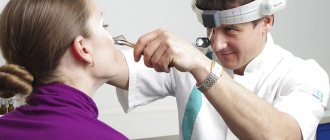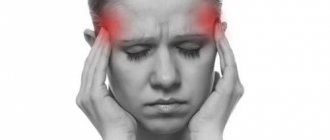Useful articles
Very often, the cause of headaches (cephalalgia) is lability of blood pressure, which is why such pains are also called “vascular.” Treatment of vascular headache should always begin with eliminating the cause, that is, normalizing the pressure if it provokes the appearance of this symptom. A typical picture of the pathology will look like throbbing or tingling pain, sometimes even a burning sensation.
In a number of cephalgia, headaches with normal pressure are also often encountered, the treatment of which can be very different from vascular headaches. Often such pain occurs against the background of other pathologies and is only a sign, not a disease. The pain mechanism is triggered by the direct impact of various processes on the sensitive receptors of the dura mater and cranial tissue. When cephalalgia appears, it is always worth determining its cause.
The following factors can cause headaches against the background of normal blood pressure:
- traumatic brain injury;
- inflammatory processes both in the head and in other parts of the body (sinusitis, otitis, mastoiditis, etc.);
- neuralgia of the facial trigeminal nerve (usually only part of the head hurts, paroxysmal, tingling);
- brain abscess (temples, frontal part hurt);
- pregnancy;
- flu, colds, adenoviral infection;
- pituitary adenoma;
- frequent stress;
- allergy;
- fistula;
- PMS in women;
- vertebral artery syndrome;
- excessive mental stress (tension cephalgia);
- general fatigue.
All these reasons require a different medical approach, so treatment of headaches with normal blood pressure consists of identifying the factor that caused it and selecting adequate therapy. Sometimes a Paracetamol or Ibuprofen tablet is enough, sometimes normal sleep and rest, in other cases the mandatory help of specialists is required.
Causes of headaches with normal blood pressure
If after measurement it turns out that the pressure is normal, but the head hurts, the symptom indicates various conditions and diseases. Often the pain goes away on its own after proper rest. If they occur frequently or are characterized by high intensity, they may be the first sign of dangerous diseases and require timely treatment.
Tension headaches
One common cause is tension headaches. They are symmetrical, begin in the frontal or temporal region, and then spread to the entire surface of the head. The pain is intense, pressing, and is sharply accompanied by additional symptoms such as nausea and increased sensitivity to light. Their reasons are:
- vascular spasms, as a result of which blood flows to the brain in limited volumes;
- tension in the muscles of the cervical spine, which also block the movement of blood;
- insufficient mobility of the neck and head during the day.
Tension headaches are often caused by stress, insomnia, and disruption of the daily routine. Antispasmodics, as well as proper rest, massage and gymnastics are recommended as treatment.
Infectious diseases
A common cause of headaches with normal blood pressure is viral diseases. During the cold season and in the off-season, there is a decrease in immunity, so outbreaks of ARVI and influenza often occur. At the initial stage, these diseases can manifest themselves as headaches, then characteristic symptoms increase:
- weakness, deterioration of health;
- increased body temperature;
- sore throat, cough, runny nose, difficulty breathing.
The main treatment method for viral diseases remains bed rest and drinking plenty of fluids. Additionally, vitamins, antiviral and symptomatic drugs are prescribed. Antibiotics may be required to prevent bacterial infection.
Allergy
If you have a constant headache, but your blood pressure is normal and other symptoms do not appear, this may be a symptom of an allergy. It is an increased sensitivity of the immune system to certain agents that normally do not cause rejection. Proteins that come from outside activate the immune system, and the body begins to fight them. This process is often manifested by a deterioration in health, headache, and swelling of the mucous membranes. Allergens can be foods, plant pollen, household dust, animal hair, and various chemicals. To eliminate symptoms, it is recommended to limit contact with confirmed allergens. If this is not possible, the patient must take antihistamines.
Diseases of the cervical spine
The cervical spine contains nerves and vessels that lead to the brain. Various anomalies of its structure, acute and chronic diseases cause disruption of the blood supply and innervation of the head, which is accompanied by intense pain. If your blood pressure is normal and your head hurts, you should undergo a cervical spine diagnosis to determine the following diseases:
- osteochondrosis is a chronic disease in which there is a decrease in strength, and then deformation of intervertebral cartilage;
- curvature of the cervical spine;
- protrusion and herniation of intervertebral discs;
- spondylosis – pathological immobility, fusion of adjacent vertebrae due to injuries and chronic diseases.
Diseases of the cervical spine require urgent treatment as they can progress with age. Tissues become less durable and elastic, inflammatory and degenerative processes worsen. However, proper treatment will stop the disease and prevent its further development.
Vascular diseases
Atherosclerosis is a dangerous chronic disease of the arteries. It is associated with impaired metabolism of fats, proteins and carbohydrates. Cholesterol and some fractions of lipoproteins accumulate in the blood. These compounds permeate the walls of blood vessels and are deposited on their inner surface, subsequently forming plaques. They interfere with the normal flow of blood through the arteries, so certain areas of the brain may experience chronic ischemia - oxygen starvation.
Typical symptoms of atherosclerosis depend on the site in which it develops. If it affects the vessels of the neck and head, the patient is bothered by constant headache, weakness and dizziness, hearing and vision impairment. Blood pressure indicators remain within normal limits. To treat atherosclerosis, a special diet and medications are prescribed that help eliminate excess cholesterol and harmful lipoproteins. Surgery may be required to remove large plaques that are dangerous.
Other reasons
Headaches can develop as a reaction of the body to any internal or external stimuli. At home, it is difficult to determine its cause unless other characteristic symptoms occur. Based on the results of the examination, it will be possible to understand how dangerous it is and choose the appropriate treatment.
There are several reasons why you have a headache if your blood pressure is normal:
- Intoxication is the accumulation of poisons and toxins in the blood and internal organs, including brain tissue. Poisoning can be caused by poor-quality food, medicines, toxic fumes from chemicals, animal and insect bites. Antidotes are used for treatment; if they are not available, gastric lavage, drip administration of electrolyte solutions and other detoxification methods are prescribed.
- Migraine is a chronic disease that manifests itself as headache attacks. Its exact cause has not been established, but a relationship with vascular disorders and hereditary predisposition has been proven. Before headache attacks, patients note a complex of characteristic symptoms, which includes dizziness, hearing and vision impairment, short-term memory loss, and loss of motor coordination.
- The consequences of injuries can manifest themselves even after many years. Traumatic brain injuries, including concussions and contusions, are accompanied by intense headaches. In the future, they worsen after physical and mental stress, in response to changes in atmospheric pressure and other factors.
Headaches with normal blood pressure often occur when work and rest schedules are disrupted. Stress, tension, insomnia, and night shift work lead to general fatigue and depletion of energy reserves. Doctors at the Clinical Brain Institute recommend timely prevention of diseases, normalizing your daily routine, and avoiding stressful situations.
Causes of dizziness
Neurologists have to deal every day with patients who complain of dizziness. It can be vestibular (true) and non-vestibular. Patients with non-vestibular vertigo usually complain of:
- balance disorder;
- feeling of intoxication;
- discomfort in the head;
- darkening of the eyes.
True dizziness is caused by damage to the vestibular apparatus, which is located in the inner ear. There are central and peripheral vestibular syndrome.
Peripheral vestibular syndrome is caused by damage to:
- inner ear;
- vestibular ganglion;
- eighth pair of cranial nerves.
Usually a person experiences additional symptoms. These are ear congestion, hearing loss, and tinnitus. There are no additional neurological manifestations, with the exception of signs of damage to the auditory nerve, but autonomic disorders are possible. Dizziness occurs only occasionally. The attacks never last more than a day. Between them, the person feels well and does not suffer from any symptoms.
With central vestibular syndrome, the structures of the brain are affected:
- vestibular nuclei and pathways;
- bridge;
- medulla;
- midbrain;
- diencephalic-subcortical structures.
Sometimes central vestibular syndrome is associated with damage to the spinal cord.
Symptoms do not appear in attacks, but are constant. There are no hearing disorders. The disease lasts for months and years. Additional symptoms of damage to the central nervous system are detected.
The main causes of peripheral vestibular syndrome:
- Meniere's disease;
- acute labyrinthitis;
- neuroma of the eighth cranial nerve;
- circulatory disorders in the internal auditory artery;
- Benign paroxysmal positional vertigo.
Central vestibular syndrome is usually one of many manifestations of pathology of the brain or spinal cord.
Diagnostic methods
It is important to determine exactly why a headache occurs with normal blood pressure. It is impossible to conduct an examination at home. To accurately understand the cause of deterioration in well-being, additional techniques are prescribed:
- clinical and biochemical blood tests to assess the functioning of internal organs and the immune system, as well as additional studies to determine the level of hormones and microelements;
- examination of blood vessels using ultrasound with the addition of a contrast agent (Dopplerography);
- MRI of the brain is a method for detecting tumors, hematomas, areas of ischemia and other pathologies;
- examination of the cervical spine using radiography and MRI.
Diagnosis of headaches at the Clinical Brain Institute is fast and accurate. This is possible thanks to modern equipment, which allows you to get the most informative results in the shortest possible time.
What is intracranial pressure
The brain is surrounded by a fluid called cerebrospinal fluid, which nourishes and protects nerve cells.
Cerebrospinal fluid is continuously produced and flows away from the skull, thereby maintaining a constant pressure. This is intracranial pressure - a certain force that puts pressure on the brain and the walls of the skull. This pressure is changed in mmHg. Art., and normally it is from 10 to 15 mm. If it is higher, this is a reason to be wary, and if the pressure exceeds 25 mm Hg. Art., this can be dangerous for brain function. If the value is more than 35 mmHg. Art. Severe and irreversible changes in the brain are possible - such situations are considered critical.
Headache treatment
Headache with normal pressure also requires timely treatment. The regimen is prescribed individually, based on the results of a complete examination. It may include the following steps:
- painkillers - a first aid method for headaches, often used at home;
- antispasmodics - prescribed to relax blood vessels and relieve spasms;
- anti-inflammatory drugs in the form of tablets or injections - necessary for the treatment of diseases of the cervical spine;
- a set of measures to relieve intoxication: the use of antidotes (antidotes), drip infusion of electrolyte solutions;
- means to improve brain function;
- additional techniques: neck and head massage, therapeutic exercises.
At the Clinical Brain Institute, we prescribe only those drugs that are truly necessary to eliminate the cause or symptoms of headaches. The ability to conduct a full diagnosis allows you to select the most effective treatment methods. Doctors with many years of experience specialize in the treatment of diseases that manifest themselves as headaches and normal blood pressure.
Types of dizziness
If a patient consults a doctor with such a complaint, it is not always a case of true (vestibular) dizziness. But since most people mention this particular word, it has also entered medical terminology. There are 4 types of dizziness, which differ in origin and symptoms. Out of 100 people who came to the neurologist, the doctor states:
- systemic dizziness – 60 patients;
- impaired coordination – 15 patients;
- presyncope – 15 patients;
- “fog” in the head and blurred vision – 10 patients.
Three of the four symptom groups are not actually dizziness. This is the result of not only neurological, but also vascular, ophthalmological, orthopedic, and mental diseases. Certain types of dizziness are observed with migraine, cardiac arrhythmia, arterial hypertension, osteochondrosis, glaucoma, anxiety disorders, multiple sclerosis and many other diseases.
Prevention methods
Headaches are often not associated with diseases, but appear as a result of a violation of the regime, poor nutrition, and a sedentary lifestyle. They are easy to prevent at home. To do this, it is enough to eat healthy foods rich in vitamins and microelements and avoid stress. It is also important to normalize your work and rest schedule, and spend time in the fresh air.
Doctors at the Clinical Institute of the Brain warn that if a headache does not go away at home even after following all the recommendations, you must contact them in a timely manner for a full examination and a treatment regimen.
Clinical Brain Institute Rating: 5/5 — 6 votes
Share article on social networks










